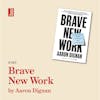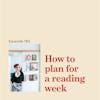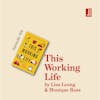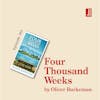Think Again by Adam Grant: why you need to rethink your life
About the book
Intelligence is usually seen as the ability to think and learn, but in a rapidly changing world, there’s another set of cognitive skills that might matter more: the ability to rethink and unlearn. In our daily lives, too many of us favor the comfort of conviction over the discomfort of doubt. We listen to opinions that make us feel good, instead of ideas that make us think hard. We see disagreement as a threat to our egos, rather than an opportunity to learn. We surround ourselves with people who agree with our conclusions, when we should be gravitating toward those who challenge our thought process.
As an organizational psychologist, Adam Grant is an expert on opening other people’s minds–and our own. With bold ideas and rigorous evidence, he investigates how we can embrace the joy of being wrong, harness the surprising advantages of impostor syndrome, bring nuance to charged conversations, and build schools, workplaces, and communities of lifelong learners.
Source: adamgrant.net
About the author
Adam Grant is an organizational psychologist and TED speaker who helps people find meaning and motivation at work.
Adam Grant has been Wharton’s top-rated professor for 7 straight years. As an organizational psychologist, he is a leading expert on how we can find motivation and meaning, and live more generous and creative lives. He has been recognized as one of the world’s 10 most influential management thinkers and Fortune’s 40 under 40.
He is the #1 New York Times bestselling author of 5 books that have sold millions of copies and been translated into 35 languages: Give and Take, Originals, Option B, and Power Moves.
Adam is the host of WorkLife, a chart-topping TED original podcast. His TED talks on original thinkers and givers and takers have been viewed more than 25 million times. He has more than 3 million followers on social media and features new insights in his free monthly newsletter, GRANTED.
Source: adamgrant.net
Idea #1 — The prosecutor, the politician and the preacher (aka, be more scientist)
This is not career advice, but advice on how to put your message across. Positioning yourself as a prosecutor (trying to prove the other person wrong), politician (seeking to win over the audience’s approval) or preacher (protecting and promoting our beliefs with sermons) mostly fails to influence anyone, and certainly doesn’t help us open our minds.
Instead, we need to be more scientist in our ways of thinking. Embrace the joy of being wrong and the fact you now know better, remaining constantly aware of the limits of your own knowledge and understanding and being actively open-minded in our pursuit of the truth.
All of this requires an important reframe of our identity: identifying ourselves by our values, rather than our beliefs. Loosening our grip on our beliefs and untangling them from our identity allows us to observe them more objectively, challenge them and change them, without feeling like we’ve fundamentally departed from who we are.
Idea #2 — Ask better questions
Asking people how, rather than why, is a great way of unlocking limitations of their understanding. When people describe why they believe something (especially when it’s on the extreme), they often commit even more to that belief. By asking them how they would operationalise their views, they will likely quickly realise the limitations of the extremes and start to tame their views. Asking how they originally formed an opinion is also a useful tool.
Adam talks about the idea of being a ‘logic bully’, or assaulting people with cold, hard, rational facts. We’ve likely all had situations where we’ve tried this and know that it doesn’t work to change anyone’s mind (usually it makes them resist and hold onto their views even tighter. Before peppering someone with the evidence, ask them the question ‘what evidence would change your mind’.
Idea #3 — Rethink your life
It’s so easy to get sucked into the tunnel vision of life, wrapping our identity in decisions made in a different time and context — especially with our profession. From a young age, we’re asked ‘what do you want to be when you grow up?’ and our careers turn into something we ‘be’ rather than something we ‘do’.
In the book Adam says that ‘kids might be better off learning about careers as actions to take rather than as identities to claim.’. He suggests scheduling a twice-yearly life checkup with yourself to assess what you’re learning, how you’re evolving and whether there’s anything that needs a rethink or a course correction. Similarly, setting regular time in your day or week to think, rather than do, and forcing a prompt for constant unlearning and rethinking, rather than getting stuck in the way you always do things and the way you always think of things.
Support my book habit: https://www.buymeacoffee.com/stephsbookshelf
See omnystudio.com/listener for privacy information.
Hey, have you subscribed to the bookmark newsletter? If you liked this, you might like my twice-monthly email with book reviews and ideas of what you should be reading, and listening to, next. Click here to subscribe.
Popular episodes
Here are some great episodes to start with.

















